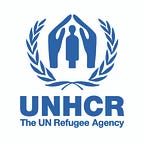5 Things to know today for IDAHOTB
Right now, someone is running for their life because of who they are or who they love.
Today, on the International Day Against Homophobia, Transphobia and Biphobia, UNHCR, the UN Refugee Agency, welcomed LGBTIQ+ activist Bianka Rodríguez as its first trans woman “High Profile Supporter” —someone who works closely with the organization to support forcibly displaced and stateless people around the world. Bianka, executive director of the El Salvador based advocacy organization, Comcavis Trans, has spent decades safeguarding the rights of LGBTIQ+ people in her own country.
When many people think of refugees, they think of people fleeing war. But millions are forced to flee persecution based on their race, religion, nationality, political opinion or membership in a particular social group. All are protected by international law, including those targeted because of their gender identity, sexual orientation or sex characteristics.
Sometimes LGBTIQ+ people are victims of their government’s draconian laws. Other times they suffer at the hands of fellow citizens, or, sadly, their own families. Here are five things we want you to know today:
❶ LGBTIQ+ people are targets. In more than 70 countries, it is illegal to engage in same-sex relationships. In at least six countries — including Yemen, Somalia, Mauritania, Iran, Afghanistan and Pakistan — it is punishable by death. Other countries have adopted laws that discriminate against LGBTIQ+ people or that the authorities use to persecute LGBTIQ+ people, such as vaguely written public indecency statutes. The International Lesbian, Gay, Bisexual, Trans and Intersex Association has published a map showing sexual orientation laws around the world.
❷ Many LGBTIQ+ refugees feel they must hide. Once they’ve fled, LGBTIQ+ people often face similar risks either during their journey or after they arrive in another country. They face a high risk for sexual abuse and violence. They are often denied basic services, such as health care or even police protection.
Out of fear, many LGBTIQ+ people hide their sexual orientation or gender identities. This makes it challenging for organizations such as UNHCR to identify them, assist them in seeking asylum, or ensure they receive health care, shelter and other essential services.
❸ The COVID pandemic has hit LGBTIQ+ displaced people hard. Everyone, everywhere, has faced challenges during the pandemic. Some people have lost family or friends. Others have lost jobs or homes. For LGBTIQ+ people who have been forcibly displaced, or who are stateless, the pandemic has exacerbated the inequality and discrimination they face every day. LGBTIQ+ people UNHCR colleagues work with say its even harder now to see a doctor or mental health expert, for example, or find a place to live or even get help when they experience violent attacks.
❹ Countries need to step up. For LGBTIQ+ refugees, resettlement in a third country can be the safest option. However, less than .5 per cent of all refugees are resettled in third countries, and the number continues to shrink as governments around the world cut back on how many they are willing to accept. This is partly due to COVID-19 restrictions, but also due to rising xenophobia around the world.
❺ You can help. Make sure your home, your community and your country are safe for everyone, including LGBTIQ+ people. Speak out when you see discrimination and abuse. Share stories of the LGBTIQ+ people or your own story. Let your government know you want your country to welcome LGBTIQ+ people, and anyone else, seeking refuge. Please visit our website to learn more about LGBTIQ+ people who are stateless, or have had to flee their country (or fled their homes but remain inside their country) — or to donate.
UNHCR, the UN Refugee Agency, is a global organization dedicated to saving lives, protecting rights and building a better future for refugees, forcibly displaced communities and stateless people.
